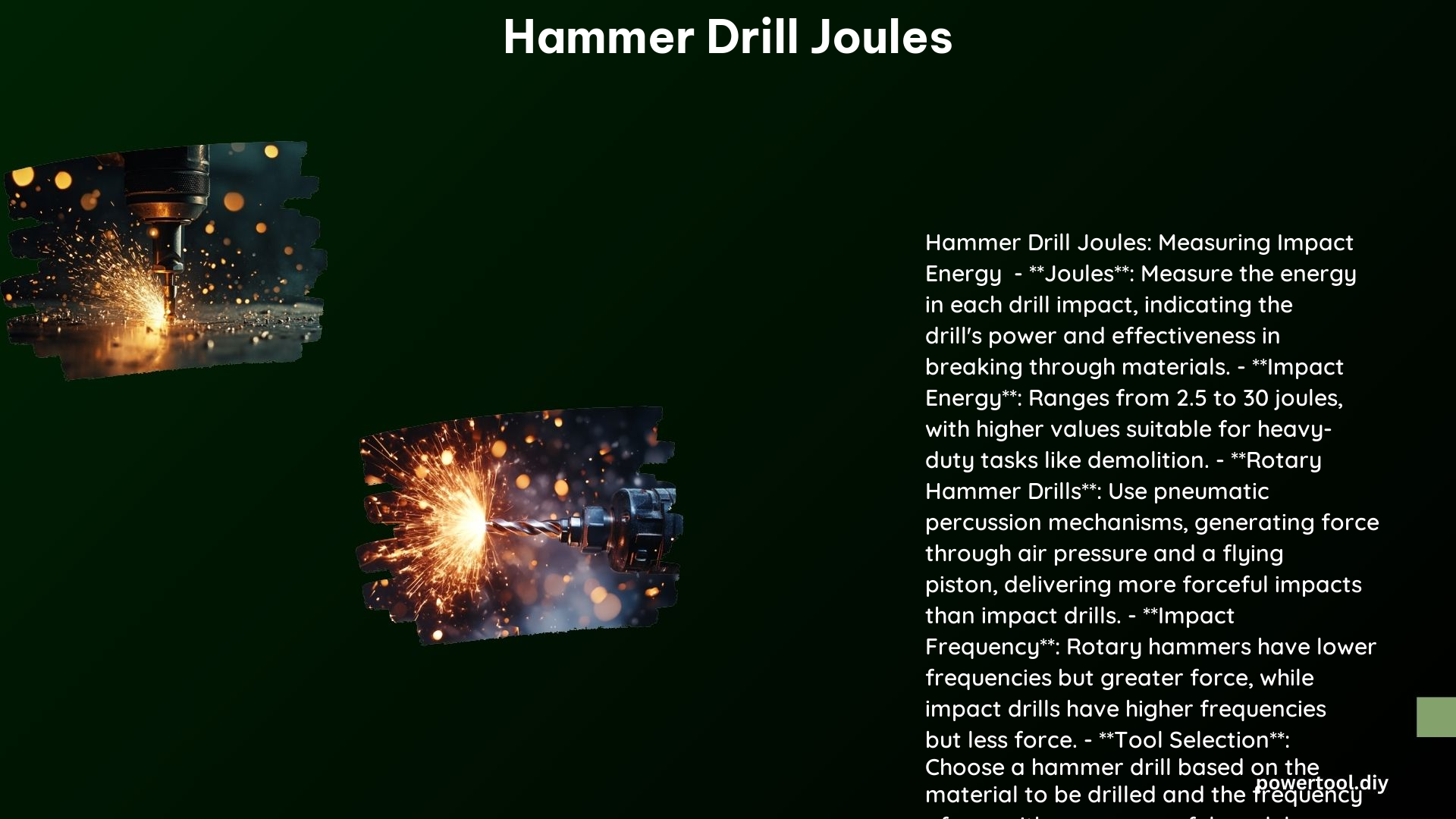Hammer drills are essential tools for DIY enthusiasts and construction professionals, as they provide the power and impact necessary to drill through tough materials like concrete, brick, and masonry. One of the critical specifications to consider when selecting a hammer drill is the joule rating, which directly impacts the drill’s performance and effectiveness. This comprehensive guide will delve into the intricacies of hammer drill joules, helping you understand the minimum joule rating required for various drilling tasks.
What is the Minimum Joule Rating Required for a Hammer Drill to Effectively Drill Through a 12 cm Thick Concrete Slab?
When it comes to drilling through a 12 cm thick concrete slab, the minimum joule rating recommended for a hammer drill is 10J. This is because a higher joule rating translates to more impact energy, which is crucial for breaking through the dense and hard concrete material.
To provide more context, let’s look at the technical specifications:
- Concrete Density: Typical concrete has a density of around 2,400 kg/m³, making it a highly dense and rigid material.
- Concrete Compressive Strength: The compressive strength of standard concrete can range from 20 MPa to 40 MPa, depending on the mix design and curing process.
- Drill Bit Diameter: For a 12 cm thick concrete slab, a drill bit with a diameter of 10-12 mm is typically used.
Given these factors, a hammer drill with a joule rating of at least 10J is recommended to effectively drill through the 12 cm thick concrete slab. This level of impact energy will provide the necessary force to penetrate the material and create the desired hole.
How Does the Joule Rating of a Hammer Drill Affect Its Performance in Drilling Through Hard Surfaces Like Concrete and Brick?

The joule rating of a hammer drill is a critical factor that directly influences its performance when drilling through hard surfaces like concrete and brick. Here’s a closer look at how the joule rating affects various aspects of the drilling process:
-
Impact Energy: The joule rating measures the amount of energy delivered per impact. A higher joule rating means the drill can generate more powerful impacts, which are essential for breaking through dense and rigid materials.
-
Drilling Speed: Hammer drills with higher joule ratings typically achieve faster drilling speeds, as they can deliver more powerful impacts in a shorter amount of time. This is particularly beneficial when working with thicker or harder materials.
-
Material Penetration: The increased impact energy from a higher joule rating allows the hammer drill to penetrate deeper into hard materials, such as concrete and brick. This makes it easier to drill larger holes or work with thicker workpieces.
-
Efficiency: Hammer drills with higher joule ratings tend to be more efficient, as they can complete the drilling task with fewer impacts, reducing the overall time and effort required.
To illustrate the impact of joule rating, consider the following example:
- A hammer drill with a 10J rating may require 50 impacts to drill through a 12 cm thick concrete slab.
- In contrast, a hammer drill with a 20J rating may only require 25 impacts to achieve the same result, due to the increased impact energy.
This demonstrates how the joule rating can significantly influence the performance and efficiency of a hammer drill when working with hard materials.
What is the Typical Joule Range for Hammer Drills Used in DIY Projects and Construction?
The typical joule range for hammer drills used in DIY projects and construction varies depending on the specific application and the type of materials being worked with. Here’s a breakdown of the common joule ranges:
DIY Projects
For most DIY projects, a hammer drill with a joule rating between 2J and 10J is generally sufficient. This range is suitable for drilling through concrete, brick, and other masonry materials for tasks such as:
- Hanging shelves
- Installing fixtures
- Mounting wall anchors
- Drilling pilot holes for screws
Construction
For heavy-duty construction projects, hammer drills with joule ratings above 10J are often required. These more powerful drills can handle thicker concrete, harder materials, and larger hole sizes, making them ideal for tasks like:
- Foundation work
- Demolition
- Drilling large-diameter holes
- Drilling through reinforced concrete
Some high-end construction-grade hammer drills can have joule ratings as high as 20J or even 30J, providing the necessary impact energy for the most demanding drilling applications.
Technical Specification of Hammer Drill Joules
When selecting a hammer drill, it’s essential to consider the technical specifications, particularly the joule rating, to ensure the tool is suitable for your specific needs. Here are some key technical details to keep in mind:
- Joule Rating:
- Measured in joules (J)
- Indicates the amount of impact energy delivered per strike
-
Higher joule ratings generally correspond to more powerful impacts
-
Wattage:
- Measured in watts (W)
- Indicates the overall power output of the hammer drill
-
Higher wattage drills are typically more powerful and suitable for heavier tasks
-
Speed:
- Measured in revolutions per minute (RPM)
- Determines the drill’s rotational speed
-
Faster speeds are often necessary for drilling through harder materials
-
Chuck Size:
- Measured in millimeters (mm)
- Determines the maximum diameter of the drill bits that can be used
- Common chuck sizes range from 10 mm to 13 mm
By understanding these technical specifications, you can make an informed decision when selecting a hammer drill that meets the requirements of your specific drilling tasks, whether it’s for DIY projects or heavy-duty construction work.
Reference:
- https://diy.stackexchange.com/questions/47295/rotary-hammers-how-many-joules-to-hammer-through-concrete-slab
- https://www.bosch-diy.com/fi/fi/all-about-diy/article/hammer-drills
- https://www.amazon.com/Brushless-Cordless-Application-360%C2%B0Auxiliary-Including/dp/B0CBFQS78Z
- https://www.greenworkstools.com/products/24v-brushless-rotary-hammer-drill-1-2j-tool-only
- https://www.manomano.co.uk/advice/rotary-hammer-buying-guide-29
